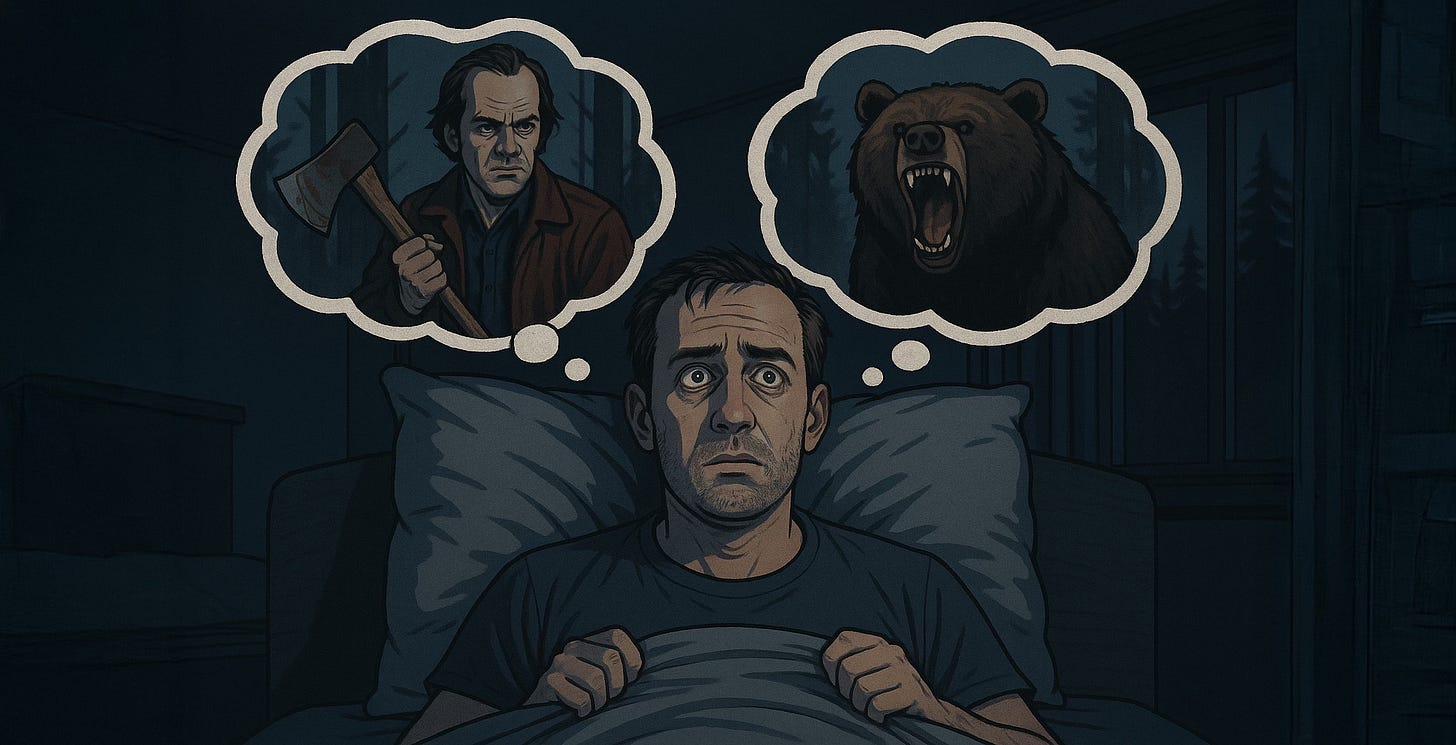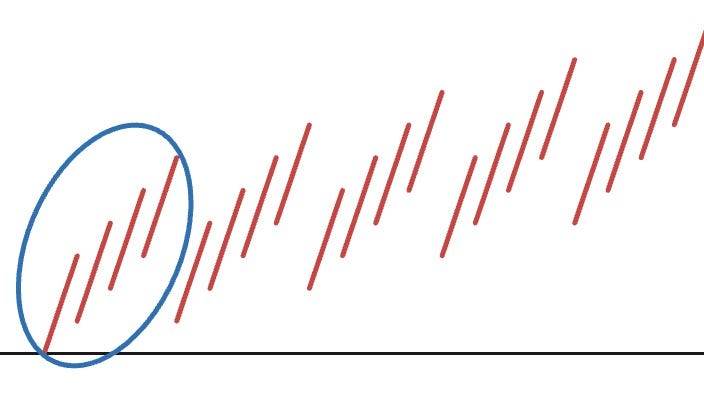On the list of recommended sleep aids, fighting a wolf in the dead of night probably ranks near the bottom. If anything, I might even argue it makes almost everything worse.
They say we suffer more in imagination than in reality, and there’s certainly some truth to it. The three months you spend worrying about that upcoming tax issue is always way worse than the ten-minute phone call with an accountant. The hard conversation you spend all day dreading is typically worse than the conversation itself.
Unfortunately for me, I was about to learn the lesson in a more aggressive way.
Once the dust had settled and everybody returned to normal after the wolf attack, I became the subject of some attention.
It’s a unique story made even more engaging by the juxtaposition of somebody doing something physically insane while also looking like he might not be able to balance on one leg in a light breeze. One friend asked if I actually touched the wolf at all, or if I just “bored it with one of my essays.”
My favourite story is from a friend who was running a meeting the following week and overheard two of her co-workers swooning over this mysterious, probably super-ripped forest saviour. As she pulled out her phone to show them a full-body shot of me clumsily eating a donut at a farmers' market she’d taken a few weeks earlier, she remarked with a sick level of glee: “allow me to completely ruin this moment for you ladies.” I have great friends.
Here’s the strange truth that may sound cool, but isn’t: I didn’t find the wolf all that scary. It’s not some mind-over-matter badassery... I just don’t find wolves terribly frightening. We don’t choose what we find scary. We don’t choose a lot of stuff.
One of the great mysteries of my life remains how my body knew to wake me up at 2:45 a.m. every single day for months on end. It didn’t seem to matter what I ate, drank, did, or time I went to bed. If I awoke and it was still dark, I didn’t need a clock to know what time it was.
I blame Dr. Todd for this. You see, Dr. Todd was the patriarch of the family in the site on the other side of us. He and his impeccable timing came over as the attack was wrapping up, armed to the absolute gills with bear spray, an axe, and a headlamp. You know, the shit I should have had.
Why was he so prepared? Because he and his wife had a very different conversation than I had with mine. Whereas ours was “OK, I’ll be right back,” theirs was more “If somebody is being murdered over there, how do we handle things?”
Upon hearing this, I began my long descent towards sleeplessness. Because if it had been a super drunk man attacking people, chances are we’d all be dead.
Nightly, I would run a scenario through my head whereby I run over to the campsite only to interrupt a murderous domestic disturbance, which in turn ends with me being scattered all over the forest floor.
It’s hard to tell if those nights were better or worse than the nights when my mind concocted a ravenous grizzly bear causing all the problems. Same result in that one, more teeth and claws though. I was playing the “Would you rather run into a man or a bear in the woods?” game years before it was a thing.
If we’re playing the stats game, it makes way more sense that I’d run headlong into either one of those scenarios than the one I did. The perpetual thoughts of axe-wielding dads and bloodthirsty bears became what fancy psychologists like to call “trauma-related rumination.”
If you’ve never had the pleasure, trauma-related rumination hits differently at 2:45 a.m.
I tried many things to stop Stephen King from writing an entire novel in my head each night. I worked out to exhaustion, I stopped drinking water past 7 p.m., I shared my feelings.
All of it was bullshit. I mean in terms of getting Woodsman Jack Nicholson and Angry Yogi Bear out of my head, completely useless.
Finally, I turned to meditation. I grew up in a very quiet household, I’m a pretty calm gentleman… it sounded appealing. Plus, who doesn’t want to clear their stupid head of all their stupid thoughts? Sign me up.
I realized almost immediately that meditation doesn’t work that way. It asks that you bring attention to your thoughts, not abandon them. This is problematic when your thoughts suck a lot and are trying to kill you. You’d like to get further from them, not closer.
My saviour ended up being a Tibetan Buddhist meditation master by the name of Yongey Mingyur Rinpoche. His voice is soothing, and he instantly calms me down. He’s like if a weighted blanket were a man. Here’s one of his talks.
Mingyur Rinpoche speaks often of how he overcame childhood panic attacks by befriending them. While, indeed, that sounded awful as hell, I was quickly becoming ready to befriend anything in exchange for sleep.
The best thing about nightly panic attacks is you don’t have to wait long to try out new strategies. Just count the number of hours until 2:45 a.m., and that’s how long you have to wait.
I awoke to the mocking darkness once again. The screaming within my mind began immediately, as it did every night before it. For the first time in a long time, I leaned into it rather than away.
I searched for the specific tone of the scream. How high was it? Was there an echo? What did the night air feel like on my skin?
In what would become a turning point in my life: I couldn’t tell. After months of not being able to get the screams out of my head, suddenly holding them for more than a moment became difficult.
Counterintuitively, I became mildly angry. You wake me up with this shit for months on end, and the first time I ask you to turn up the volume, you shut up? That was the answer all along? Reverse psychology? The same garbage I use to get my kids to wear mittens when it’s cold?
Like a bully that doesn’t get the tears of validation they came for, my panic became uninterested in me. I even pleaded for it to come back. Part of me even meant it. My next memory was my alarm.
Oh, it’s not a meditation at all, but it is a meditation concept that I haphazardly turned into a therapy born of desperation and exhaustion.
That concept is this: the mind does not care to be pushed around. You cannot boss it, demand things of it, or belittle it into submission. You are not in control of what it brings to you. The odds of it doing the opposite of what you ask are high, so proceed with caution.
And just like that, after a single moment in a single night, my sleep mostly returned. I awoke many times after that, but it was almost never an issue again.
Don’t be insane. Not even a little. Well, maybe. For me, kinda. It’s complicated.
For starters, one of the reasons the self-help industry is such a money mine is that true self-help must be enormously individualized. There are probably 50 Very Good Things you can try, and what will work for you is likely some cocktail of several of them, and your cocktail probably won’t work on other people.
So whenever you hear some yahoo (like me) saying “here’s the cure to ,” as attractive as that sounds, what they’re saying is “here’s the cure to for me.”
Secondly, not all trauma is the same. My trauma kinda ruled in that it was devastating enough to break me down into component parts, but the real bad stuff was imaginary. It wasn’t so devastating that it shattered me into stardust and left me scattered across the entire planet. Important distinction. As far as traumas go? You could do worse.
Not everyone is this lucky. Beyond a certain threshold of severity, trauma takes on a different shape. Remembering what many call a “capital T Trauma” can put the sufferer in a state similar to the event happening for the first time (the word we use for this—"triggered"—has since been neutered by people over-using it for minor inconveniences, but it is very real and very serious).
For that person, it’s much more complicated than simply saying “explore the thoughts more deeply and demand your mind pay closer attention to this terrible feeling.” Re-traumatizing is a thing, and not something to be dealt with lightly. While the end solution to both types of trauma can be very similar, the more severe version should be done under the supervision of a trained professional.
The overarching takeaway I took from the experience is this: the mind is a funny creature, and despite its track record for not responding to demands, we tend to demand a lot of it.
Despite the mind’s proven resistance to demands, we keep making them: stop craving cake, start liking the gym, shut up at 2:45 a.m. Indeed, a great deal of human suffering can be summed up as the space between what we feel and what we want to feel.
There was ultimately a limit to my newfound trick. Angrily playing the reverse psychology game did eventually give way to a better method, but the first lesson had been found: stop trying to control your thoughts.
.png)





